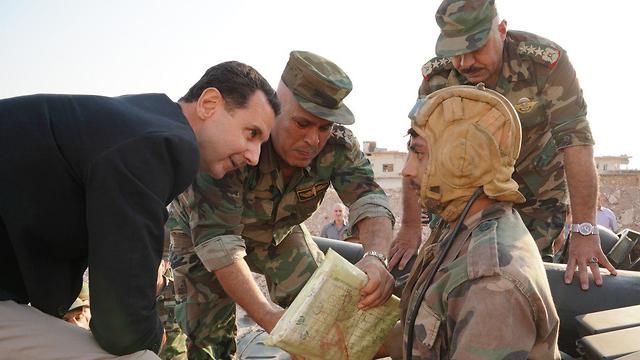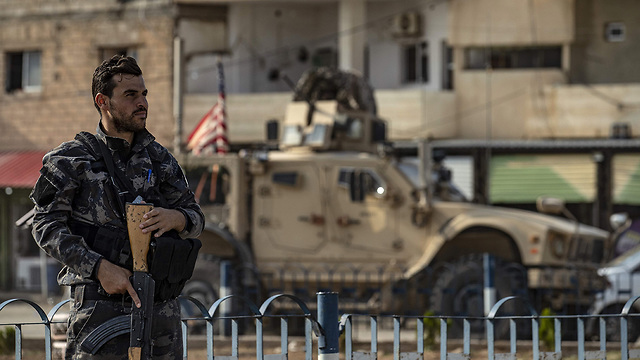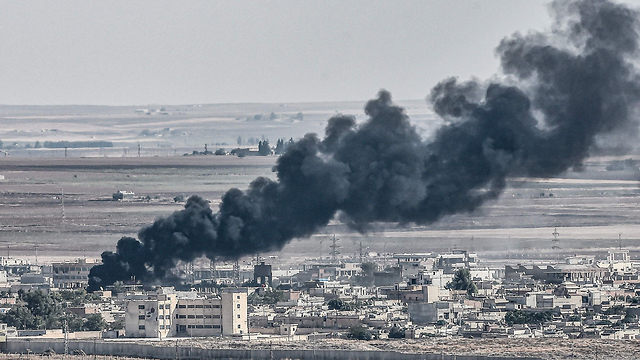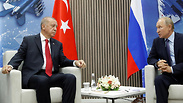
As truce deadline nears, Putin, Erdogan meet in Syria
Talks between Russian and Turkish presidents likely to be crucial in determining arrangements along Syrian-Turkish border, where Ankara demands a long "safe zone" cleared of Kurdish fighters
The talks between Erdogan and Putin are likely to be crucial in determining arrangements along the Syrian-Turkish border, where Ankara demands a long "safe zone" cleared of Kurdish fighters.
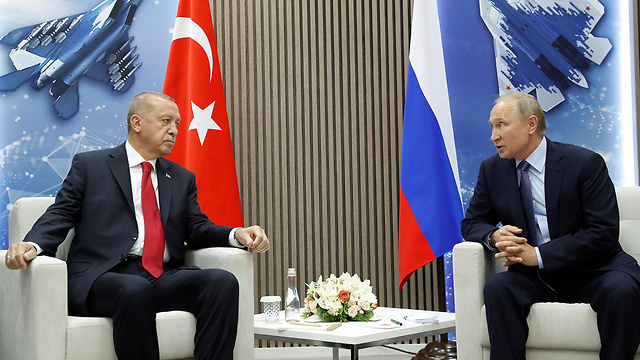
Russia has strengthened its power broker role in Syria, especially after the U.S. abruptly decided to pull its troops out of northeast Syria two weeks ago. That pullout opened the way for Turkey to launch its offensive against Kurdish fighters on Oct. 9, which has been paused the past five days under the U.S.-brokered cease-fire.
Seeking protection, the Kurds turned to the Syrian government and its main ally, Russia. The Syrian army has advanced into parts of the area, and Russia deployed its troops in some areas to act as a buffer force.
Russia has powerful sway with all the multiple parties vying for the border. Turkey has suggested it wants Russia to persuade the Syrian government to cede its control over a major chunk of territory in the northeast. The Kurds are hoping Russia can keep Turkey out and help preserve some of the autonomy they carved out for themselves during Syria's civil war.
Syrian President Bashar Assad has vowed to reunite all the territory under Damascus' rule. On Tuesday, Assad called Erdogan "a thief" and said he was ready to support any "popular resistance" against Turkey's invasion.
"We are in the middle of a battle and the right thing to do is to rally efforts to lessen the damages from the invasion and to expel the invader sooner or later," he told troops during a visit to the northwestern province of Idlib.
The immediate question was the fate of the U.S.-brokered cease-fire, which was to run out at 10 p.m. (1900 GMT) Tuesday evening.
Erdogan said 1,300 Syrian Kurdish fighters had yet to vacate a stretch of the border as required under the deal. He said 800 fighters had left so far. The Kurdish-led force has said it will carry out the pullout.
If it doesn't, Erdogan warned Tuesday, "our offensive will continue from where it left off, with a much greater determination".
"There is no place for the (Kurdish fighters) in Syria's future. We hope that with Russia's cooperation, we will rid the region of separatist terror," he said.
Under the accord, the Kurdish fighters are to vacate a stretch of territory roughly 120 kilometers (75 miles) wide and 30 kilometers (20 miles) deep between the Syrian border towns of Tal Abyad and Ras al-Ayn, but that leaves the situation in the rest of the northeastern border unclear.
Currently, other than the few places where Syrian troops have deployed, they are solely in the hands of the Kurdish-led fighters -- a situation Ankara has repeatedly said it cannot tolerate. Turkey considers the fighters terrorists, because of their links to Kurdish insurgents inside Turkey.
Turkey wants to control a "safe zone" extending more than 400 kilometers (250 miles) along the border, from the Euphrates River to the Iraqi border. There, it plans to resettle about 2 million of the roughly 3.6 million Syrian refugees currently living in Turkey.
Russia sent a new signal to Turkey about the need to negotiate directly with Assad. Kremlin spokesman Dmitry Peskov emphasized that only Damascus could authorize the Turkish troop presence on the Syrian territory.
Assad gave a symbolic show of Damascus' goal of regaining the border, visiting troops in northwestern Idlib province, where his forces are battling rebels. Idlib is adjacent to an enclave along the border that Turkey captured several years ago in another incursion. Turkey also has observation points inside Idlib, negotiated with Russia, to monitor a cease-fire there between the government and opposition fighters and jihadi groups.
Assad called Erdogan "a thief, he stole the factories and the wheat and the oil in cooperation with Daesh (the Islamic State group) and now is stealing the land".
He said his government had offered a clemency to Kurdish fighters -- whom it considers separatists -- to "ensure that
everyone is ready to resist the aggression" and fight the Turkish assault.
Syrian state media reported Tuesday that government forces entered new areas in Hassakeh province at the far eastern end of the border, under the arrangement with the Kurds.
Turkey's incursion into Syria has led to an international outcry, which has in turn enraged Erdogan, who has accused his NATO allies of not standing by Turkey.
European Council President Donald Tusk on Tuesday condemned the incursion and called on Turkey - which is a candidate for EU membership - to pull out troops.
"No one is fooled by the so-called cease-fire," Tusk told EU lawmakers. Any course other than a Turkish withdrawal "means unacceptable suffering, a victory for Daesh (the Islamic State group), and a serious threat to European security," he said.
German Defense Minister Annegret Kramp-Karrenbauer proposed the establishment of an internationally controlled security zone in Syria, "with the inclusion of Turkey and Russia".
Meanwhile, U.S. troops pulling out of Syria were heading to neighboring Iraq, but Iraq's military said Tuesday the troops did not have permission to stay in the country.
The Iraqi military in a statement said the American troops currently withdrawing from Syria have acquired permission from the Iraqi Kurdish regional government to enter Iraq to later be transferred out of the country. It added that these troops do not have any approval to stay in Iraq.
The statement appears to contradict U.S. Defense Secretary Mark Esper who has said that under the current plan, all U.S. troops leaving Syria will go to western Iraq and the military will continue to conduct operations against the Islamic State group to prevent its resurgence.
Esper said he has spoken to his Iraqi counterpart about the plan to shift the more than 700 troops leaving Syria into western Iraq.










